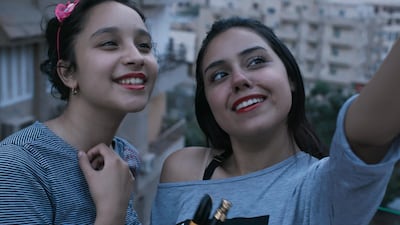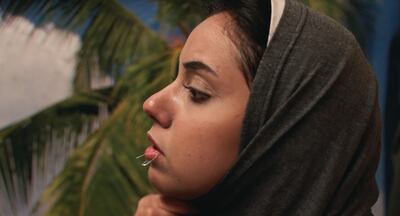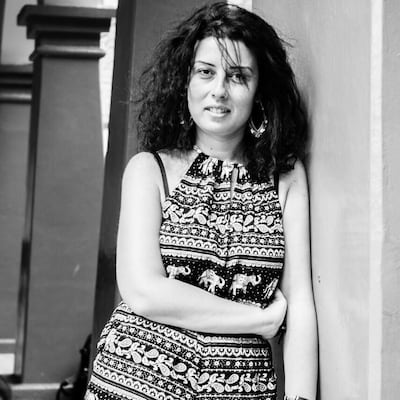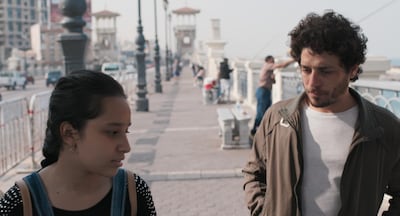When Ayten Amin heard that her second feature, Souad, was chosen as part of the official selection for the Cannes Film Festival last year, it was a joyous moment. Amin is the first Egyptian female director to be accepted into the world's most prestigious film event. However, Cannes was cancelled because of the pandemic, and while festival organisers announced the chosen films, they did not say if they would have competed for the Palme d'Or. "They said they would leave it to our imagination," Amin says, with a laugh.
Best known in Egypt for her 2017 hit TV show Saabe' Gaar (Seventh Neighbour), Amin, 40, now finds herself in a rather unique position, with Souad selected to play in the Panorama strand of the Berlin International Film Festival, which started yesterday and runs until Friday. Rarely, if ever, do these two behemoth festivals select the same films.
“I’m so happy that we were selected by two A-list festivals,” she says, from her home in Cairo. “All of this happened while I’m still sitting on my couch. It was the first time for me to go to an A-List festival. And at the same time I didn’t have the experience at all.”
Although the Berlin event is going ahead this week, films will be screened to the jury, buyers and the press online. In June, if it's deemed safe, the movies will play to Berlin audiences in cinemas.
As frustrating as all this has been for Amin, it's a testament to the subtle power of Souad, a story of two teenage sisters living in the small Nile delta city of Zagazig. "I wanted to make a film with protagonists who are people outside the capital," explains Amin, who says Egyptian film and TV is too dominated by stories set in Cairo.
The point was not simply to show lesser-known parts of Egypt, however, but to zero in on how modern girls living outside Cairo cope with the pain and perils of adolescence. Outwardly, the studious Souad (Bassant Ahmed) seems a model daughter to her conservative family, but secretly she enjoys a double life on social media, explicitly chatting with men – something even her naive younger sibling Rabab (Basmala Elghaiesh) is only dimly aware of.
“I was always interested in how social media played a role in changing the relationships we have,” Amin says. “It plays a major role for girls in small cities in Egypt because it’s like a window of freedom. It’s a place where they can play certain roles away from their daily life, their conservative life. It’s a place where they have a daily boost – Souad can have relationships, she can flirt with guys. And at the same time, she doesn’t feel guilty about it because it did not happen.”
Amin, who grew up in Cairo, was not surrounded by social media in the way most are today – and she was intrigued by comparisons to her adolescent years in the 1990s. "We faced the same problems, but the way we dealt with them was totally different. They seem to have more freedom, but at the same time, it's not real. I think it complicates things. Psychologically, it's very draining – you feel free for 30 minutes on your phone. And then you feel that it's not real. It adds to the frustration."
These frustrations simmer away in Souad, a film that is tricky to talk about without revealing a dramatic spoiler at the midway point (inspired by a real-life incident that happened when Amin was at school). Suffice to say, the film deals handsomely with the trials of adolescence, first love and the feeling of self-validation that so many people (not only teenagers) seek out through social media. It's also made distinct by the natural performances that Amin gleans from her cast.
All the youngsters were first-timers, and Amin auditioned more than 250 girls before selecting Ahmed and Elghaiesh, and the other girls who play their friends. The scenes were improvised heavily, workshopped over a five-month rehearsal period. “I was looking for girls that when you watch the film, you almost feel that it’s a documentary, that you’re not sure.”
As this creative period unfolded, Amin paid particular attention to the online interests of her actresses. “I was discovering a lot about this world from them. And I think they were discovering a lot about themselves.”
Her young cast were all fans of her work – or at least they'd all seen Saabe' Gaar, which follows the interconnected lives of several residents of the same apartment building. "They all knew it – it's why they came to the casting. They were not that interested in the film. They were interested in working with someone who did this TV series that they were watching."
Prior to that, Amin made her 2013 feature debut, Villa 69, about a dying architect – a story partly inspired by her father and starring famed Egyptian actor Khaled Abol Naga. Amin first met him when she worked in customer service in a bank in Cairo in the early 2000s. "He used to come to the bank. And I dealt with him maybe three times," she says.
Amin, whose father also worked in banking, was not cut out for the financial sector. “The worst place I could work,” she says with a groan. “I was not a good banker at all. It was always about selling the bank products, convincing them to take a credit card. I was totally not interested in selling anything.”
That time spent handling other people's money wasn't wasted, though. Amin is now working on a TV comedy series set in a bank and a mainstream feature-length comedy. "I'm open to going back and forth between art house and commercial work as long as I like the story," she says. In her eyes, there's inherently no difference. "There is something similar in all of my work – it's always about people in their daily lives. I'm always telling stories that are true to me."




